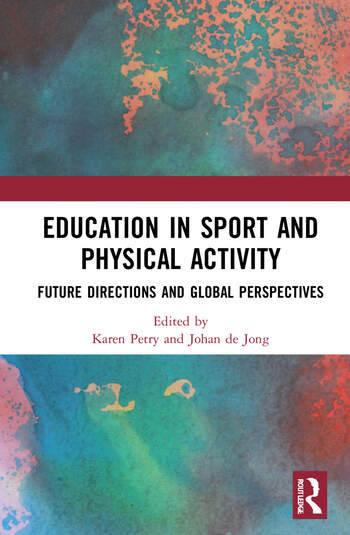ENSE Board Members Karen Petry & Johan de Jong published their latest book "Education in Sport and Physical Activity - Future Directions and Global Perspectives".
The book examines education in sport coaching, sport management, PE teacher training, physical activity and health promotion, and the emerging discipline of outdoor studies, considering how trends such as globalisation, digitalisation, and privatisation are having a profound impact on education programs.
Designed to invite self-reflection, to provoke debate and to open up new cross-disciplinary and international perspectives within sports organisations and higher education institutions, the book is designed for advanced students as well as researchers, teachers, and policy makers and includes contributions from several ENSE members.
It is must-buy for everyone working in the field of sport education and is now available here.

Last month, the European Union published a bevy of sports-related statistics that are sure to be of use to both researchers and practitioners alike.
Most notably, after a four year gap, the new Eurobarometer on sport and physical education was released in March. Profiling various sport and physical activity trends across Europe, the report unfortunately indicates a continued decline in sport participation. In fact, the proportion of those who say they never exercise or play sport has increased from 42% to 46% Europe-wide. Given this troubling direction, it continues to be up to the sport education sector, and the sport sector writ large, to find ways to combat these trends.
The full report can be here.
And, thanks to cooperation between Eurostat and the Directorate General for Education, Youth, Sport and Culture (DG EAC), sport statistics related to the social and economic dimension of sport have been put together and summarized in an comprehensive, easily digestible publication, which can be found here.
In the year 2016, the Vrije Universiteit Brussels, an ENSE member — with the support of streetfootballworld, ENGSO youth and VDAB — was commissioned by the Education, Audiovisual and Culture Executive Agency (EACEA) of the European Union to investigate sport’s contribution to the employability of young people in the context of the Europe 2020 strategy.
The final report of this study was released last month.
This study investigates sport’s contribution to the employability of young NEETs (not in employment, education or training) in the context of the Europe 2020 strategy. Its aim is to identify the key components needed to effectively produce outcomes in sport for employability programmes. Through this, a generic ‘programme theory’ for optimal sport for employability programmes then developed which identified the key components, mechanisms, relationships and a presumed sequence of causes and effects.Thus, this study can also be used as a robust basis for monitoring and evaluation of existing programmes, as well as to optimise design and implementation of future initiatives. Insights from this study also provide the basis for a number of policy recommendations
The full report, titled Study on the contribution of sport to the employability of young people in the context of the Europe 2020 Strategy is available here.
The European Commission just published a very relevant title for the Sport Education community.
The final report regarding the 'Study on sport qualifications acquired through sport organisations and (sport) educational institutes' was released earlier this year. Looking at the more formalized role of sport in the EU since the implementation of the Lisbon treaty, the report namely looks at sport education, sport employment and sport qualifcations in the EU's 28 member states.
An insightful tool for anyone in sport sector, it can be found here.